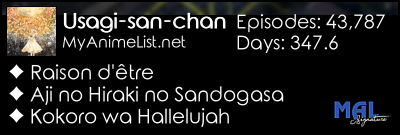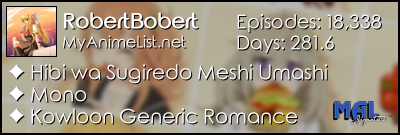New
Oct 3, 2022 9:21 AM
#1
| edit so everyone can see: I'm not saying this is bad or complaining, I'm just curious about the reasons behind this and the cultural differences that provoke this strangeness. What are some japanese sayings in anime that sound way too corny or weird when translated, and you wonder if there's maybe a different meaning to japanese people, or even translation? "I won't lose" seems to be a favourite catchphrase for anime characters everywhere. Be it a battle, a test, or just a game of goldfish scooping, they'll just shout "I WON'T LOSE" out of the blue to the approval and cheers of people around them, as if it is the most normal thing to say in any given situation. Is this something that gets lost in translation and just sounds corny in english, or is it a literal translation that just sounds strange to us? Another one that a lot of people should wonder is how they interchange "I love you" and "I like you". I remember someone on reddit iirc recalling how he started hanging out with a Japanese girl, and in just a few days she said she loved him to his surprise, but it wasn't the 'love' that we mean when we say it in english or other western languages. |
Satyr_iconOct 3, 2022 10:52 AM
 |
Oct 3, 2022 9:22 AM
#2
| Kind of reminds me of Asta's 'not yet' phrase in Black Clover, it feels really obnoxious when I see this kind of thing as well |
 "Only one with the courage to shoulder the burden of their own fate can be called a hero.." |
Oct 3, 2022 9:23 AM
#3
Satyr_icon said: What are some japanese sayings in anime that sound way too corny or weird when translated, and you wonder if there's maybe a different meaning to japanese people, or even translation? "I won't lose" seems to be a favourite catchphrase for anime characters everywhere. Be it a battle, a test, or just a game of goldfish scooping, they'll just shout "I WON'T LOSE" out of the blue to the approval and cheers of people around them, as if it is the most normal thing to say in any given situation. Is this something that gets lost in translation and just sounds corny in english, or is it a literal translation that just sounds strange to us? Another one that a lot of people should wonder is how they interchange "I love you" and "I like you". I remember someone on reddit iirc recalling how he started hanging out with a Japanese girl, and in just a few days she said she loved him to his surprise, but it wasn't the 'love' that we mean when we say it in english or other western languages. It's almost like different cultures use language in different ways or something. |
 This glorious signature image was created by @Mayumi! I am the Arbiter of Absolute Truth, and here is my wisdom: "Anime was always influenced by the West. This is not news. Shoujo is the superior genre primarily aimed at young people. Harem/isekai are lazy genres that refuse any meaningful innovation. There is no 'Golden Age.' There will always be top-shelf anime. You should be watching Carole & Tuesday." |
Oct 3, 2022 9:54 AM
#4
Oct 3, 2022 10:02 AM
#5
| But characters say all sorts of corny things in American cartoons. |
Oct 3, 2022 10:03 AM
#6
Oct 3, 2022 10:07 AM
#7
| National aspects, I think. Plus it sounds so cool and amazing! I like it! |
 |
Oct 3, 2022 10:08 AM
#8
Zelkiiro said: It's almost like different cultures use language in different ways or something. Yeah, that's the point of this thread? Discussing those differences. Khashishi said: But characters say all sorts of corny things in American cartoons. Yeah? I'm not saying it's bad, I'm curious about the reason they say this. |
 |
Oct 3, 2022 10:15 AM
#9
Satyr_icon said: What are some japanese sayings in anime that sound way too corny or weird when translated, and you wonder if there's maybe a different meaning to japanese people, or even translation? "I won't lose" seems to be a favourite catchphrase for anime characters everywhere. Be it a battle, a test, or just a game of goldfish scooping, they'll just shout "I WON'T LOSE" out of the blue to the approval and cheers of people around them, as if it is the most normal thing to say in any given situation. Is this something that gets lost in translation and just sounds corny in english, or is it a literal translation that just sounds strange to us? Another one that a lot of people should wonder is how they interchange "I love you" and "I like you". I remember someone on reddit iirc recalling how he started hanging out with a Japanese girl, and in just a few days she said she loved him to his surprise, but it wasn't the 'love' that we mean when we say it in english or other western languages. Yes, dialogues in Japanese anime don't resemble how real people speaks, but if they are made for children I guess it's normal. I finnaly understood that I am the problem, being 24 years old guy who complain about shows for kids are too childish, for example One Piece, so I just stoped watching it. |
ReegrezSNKOct 3, 2022 10:33 AM
Oct 3, 2022 3:37 PM
#10
| I presume mostly just 'entertainment' one liners that often get used in asian media. like jap irl tv every 5 seconds someone is bound to say 'sugoi' (amazing) or 'oishii' (delicious) or something like that, even if they are like staring at a piece of cardboard As for lost in translation, depends on the phrase really. Jap is a more contextual language so rather than translating it's more like interpreting, which depends on the quality of the translator in question. hence where the suki confusion comes from because it can mean like/love depending on the context it's used in. Or hai which literally translates to 'yes' but gets translated into 1000 different things and a lot of the one liner stuff are often used by cringy CGDCT girls or shounen protags, who are already over the top annoying so it makes sense lol ScionOfCyan said: The word I noticed so often that I ended up finally looking it up was "ganbatte." There isn't really an analogous commonly used expression of encouragement in English, at least not in my area. Good Luck! is not commonly used lol? |
 'On-Hold' is another way for a completionist to say 'Dropped' |
Oct 3, 2022 5:01 PM
#11
ScionOfCyan said: Short_Circut said: I presume mostly just 'entertainment' one liners that often get used in asian media. like jap irl tv every 5 seconds someone is bound to say 'sugoi' (amazing) or 'oishii' (delicious) or something like that, even if they are like staring at a piece of cardboard As for lost in translation, depends on the phrase really. Jap is a more contextual language so rather than translating it's more like interpreting, which depends on the quality of the translator in question. hence where the suki confusion comes from because it can mean like/love depending on the context it's used in. Or hai which literally translates to 'yes' but gets translated into 1000 different things and a lot of the one liner stuff are often used by cringy CGDCT girls or shounen protags, who are already over the top annoying so it makes sense lol ScionOfCyan said: The word I noticed so often that I ended up finally looking it up was "ganbatte." There isn't really an analogous commonly used expression of encouragement in English, at least not in my area. Good Luck! is not commonly used lol? ‘Good luck’ doesn’t have the connotations of ‘keep trying’ (often after a setback) that you very commonly see ‘ganbatte’ used for. Look for it in the future and you’ll see that ‘good luck’ substitutes very poorly for ‘ganbatte’ in many instances. I mean, ganbatte (ganbare) translates directly as good luck or do your best. And ganbatte is very much used in this GL context like in classic sports festivals arc or when a character has a big event coming up |
 'On-Hold' is another way for a completionist to say 'Dropped' |
Oct 3, 2022 5:03 PM
#12
| different cultures have different ways of speaking, lol niso's works part of it comes from the unique way of speaking. |
Oct 3, 2022 5:26 PM
#13
| And western media isn't full of corny catchphrases that nobody actually says in real life? |
Oct 3, 2022 5:30 PM
#14
| There's no 'real' reason behind it I imagine. Saying 'I won't lose' during a battle emphasizes, well the character not losing. Same thing during a test, a character says things like 'I will take the first place!' or 'there's no way he can rank higher than me' to show just how strong their will is. Of course, I don't think real Japanese people say these phrases, in fact they don't even talk like they do in anime (in case anyone didn't know yet), at least my Japanese friend and his family doesn't. |
Oct 3, 2022 5:46 PM
#15
| They do have many 'I'm ready to do this' moments don't they. I assume it is a confidence boost, a be part of the team and don't let them down or stay positive sort of thing maybe I don't know for sure. I mean the customer service IRL if to be believed of the 110% sort of effort given is something even if in a high school anime or maybe a job based one where you see it I guess. When it comes to something like saying 'delicious' in anime and on Japanese food shows it's annoying but it's a thing. When watching some shows and they go 'do you not think it's good' I thought oh ok you don't see that and they just make the character say it's good. With food shows they have to say it's good, it's very important, it's unrealistic and over-exaggerated but they don't want to disrespect it or it's part of the programming I guess I forget the full reason why. Even if covering crops I guess too, which makes their shows kind of boring and overly down to a foreigner's perspective. Watch this video for why they overdo or even have reactions on tv (honestly it feels like when you have a laugh track, the 'were telling you to think this is funny' thought you may have I guess it can seem and may be intentional I'm not sure don't remember): https://www.youtube.com/watch?v=mtnVU4BU39E Some phrases/adverbs are just a thing as part of the culture I guess. I mean the amount of word play in light novels/manga/dialogue heavy anime makes that clear. The no opinions or not picking a side thing is weird when you ask someone what they think IRL they may say 'I think my cat is dead' and your like which is it, why did you say that.... it wasn't even related I just asked if you want a drink or what your doing after hours (I think the situation was in a video I watched a while ago). It's weird they don't choose a side. At least from YouTube videos I've seen where some older people just won't response with a side just a neutral or a 'I don't want to answer this response'. With teens though I mean see any that make YouTube videos and are fine doing that, they are happy to show off their school and such and it's pretty cool seeing the differences. In other cases I guess online people will say anything of internet lingo and level of positive or negative things regardless as a free space to say things but IRL they don't but it depends on the person and how committed to being a collective they are about a certain topic I guess but the collective mindset is a thing. |
Oct 3, 2022 7:11 PM
#16
ScionOfCyan said: Short_Circut said: ScionOfCyan said: Short_Circut said: I presume mostly just 'entertainment' one liners that often get used in asian media. like jap irl tv every 5 seconds someone is bound to say 'sugoi' (amazing) or 'oishii' (delicious) or something like that, even if they are like staring at a piece of cardboard As for lost in translation, depends on the phrase really. Jap is a more contextual language so rather than translating it's more like interpreting, which depends on the quality of the translator in question. hence where the suki confusion comes from because it can mean like/love depending on the context it's used in. Or hai which literally translates to 'yes' but gets translated into 1000 different things and a lot of the one liner stuff are often used by cringy CGDCT girls or shounen protags, who are already over the top annoying so it makes sense lol ScionOfCyan said: The word I noticed so often that I ended up finally looking it up was "ganbatte." There isn't really an analogous commonly used expression of encouragement in English, at least not in my area. Good Luck! is not commonly used lol? ‘Good luck’ doesn’t have the connotations of ‘keep trying’ (often after a setback) that you very commonly see ‘ganbatte’ used for. Look for it in the future and you’ll see that ‘good luck’ substitutes very poorly for ‘ganbatte’ in many instances. I mean, ganbatte (ganbare) translates directly as good luck or do your best. And ganbatte is very much used in this GL context like in classic sports festivals arc or when a character has a big event coming up You literally just said it translates “good luck” or “do your best” (I’ve seen it in situations where “don’t give up now” would be best). In English precisely defined, these three phrases are not synonymous. That’s kind of what I was getting at with my original post. Good Luck and Do your Best are often quite interchangeable, not always ofc. Telling someone "good luck on the quiz" vs. "do your best on the quiz" have a pretty similar connotation to it Your initial posts mentions There isn't really an analogous commonly used expression of encouragement in English which is what Good Luck literally is. And it is very analogous because it is one of the common definitions of it In the context of 'keep trying' as a way ganbatte could be interpreted as, sure, good luck wouldn't necessarily work. But the use of ganbare in and of itself (your OP) often has a meaning associated with good luck, it isn't incorrect to associate the 2 with each other. Just like shujin can be interpreted as master or husband depending on the context, but it isn't wrong to associate the word with either. |
 'On-Hold' is another way for a completionist to say 'Dropped' |
Oct 3, 2022 8:03 PM
#17
| English and Japanese are different languages. Things that sound normal in one language will sound weird in another because it isn't a common way of speaking. It has nothing to do with Japanese specifically. For example, imagine a situation in an English show where a bad guy is trying to get away or something, and the protagonist says "I don't think so!" and goes to stop him. If you were to translate that literally into Japanese, it would sound very weird. Situations like "I won't lose!" sound kind of weird in English, but the meaning still makes sense to us. They also have to make sure the English line fits the same screentime/mouth flaps. So it is typically easier to just translate as is. Short_Circut said: Good Luck and Do your Best are often quite interchangeable, not always ofc. Telling someone "good luck on the quiz" vs. "do your best on the quiz" have a pretty similar connotation to it Your initial posts mentions There isn't really an analogous commonly used expression of encouragement in English which is what Good Luck literally is. And it is very analogous because it is one of the common definitions of it In the context of 'keep trying' as a way ganbatte could be interpreted as, sure, good luck wouldn't necessarily work. But the use of ganbare in and of itself (your OP) often has a meaning associated with good luck, it isn't incorrect to associate the 2 with each other. Just like shujin can be interpreted as master or husband depending on the context, but it isn't wrong to associate the word with either. I believe his point is that ganbatte is a word that doesn't have a direct equivalent in English. Which is true. Depending on the context of its usage, there are different ways we can translate it to make sense for an English audience. There are many cases where it can be translated directly into good luck, or try your best, but also cases where it cannot. Compare it to a word like 雪 (yuki), this is a word that does have an analogous word in English, snow. It is a word that by itself will always mean snow, and does not require a different translation really depending on context. |
Oct 3, 2022 8:53 PM
#18
@ScionOfCyan  sigh may I remind: There isn't really an analogous commonly used expression of encouragement in English, at least not in my area. also didn't know discussing a topic immediately resorts to child like behaviour, but I guess MAL never changes innit @Saku_k Their point is that there is no analogous english equivalent expression that conveys the overall meaning ganbare provides. Depending on the context of its usage, there are different ways we can translate it to make sense for an English audience. But there are also certain meanings that are more commonly used than others when saying the word. Even in English, a word like 'fag' for instance has different meanings to it (one being that of a cigarette), but is most commonly associated with being a derogatory word towards gays. hell even good luck has different meanings to it depending on the context it is used in. Your example of yuki for instance, simply writing/saying ゆき (without kanji differentiation) in and of itself does not necessarily indicate snow, as it can also mean 'bound for' (行き). But the saying of ゆき is way more associated with snow. Similarly with ganbare, yes it has multiple meanings to it but it is commonly associated with encouragement akin to good luck or do your best (both are interchangeable more often than not), hence why it is a flawed argument to say there isn't really an English equivalency to the word. |
Short_CircutOct 3, 2022 9:02 PM
 'On-Hold' is another way for a completionist to say 'Dropped' |
Oct 4, 2022 12:30 AM
#19
| English and Japanese are very different languages, a lot of things don't translate very well. Makeru may be translated as 'to lose', but that doesn't mean 'makeru' and 'to lose' have exactly the same meaning, it's just the closest English word available. So they're not actually saying "I won't lose", they're saying something subtly different where "I won't lose" is just the closest you can get in a short English sentence. |
Oct 4, 2022 1:44 AM
#20
| Cultural differences or not, I think "Makenai!" (I won't lose!) is present in every language, just people are not saying it out loud even in japanese. Yes, it's cheesy, it's an anime/manga convention to showcase the dedication of a character...in a fight...or spending money on a crane game like a mad man (definitely a parody)...and it is supposed to be cartoonish and exaggerated. I think the most exotic of those "weird japanese sayings" have roots in traditional theater like Noh and Kabuki. A western example would be saying in deeply dramatic voice "Et tu, Brute?". Similar case with "Ganbare!" (Keep fighting!). You can see the crowd on western sport evens screaming very similar things. |
Oct 4, 2022 5:35 AM
#21
| Is "I won't lose" a weird phrasing in English? Like, is it not normal? I can imagine a native speaker saying this and I don't think I'll find it weird at all... Coming from a non-English speaker |
  𝑇𝐼𝑃𝑆 𝐼𝑁 𝐺𝐼𝑁𝑇𝐴𝑀𝐴 - NOT your usual shounen anime - Pure comedy? DEAD WRONG - Treat Gintama as SoL/weekly sitcom especially earlier seasons - Ep 1 & 2 are for manga readers - BIG patience for its 'slow' start |
Oct 4, 2022 7:59 AM
#22
Oct 4, 2022 8:23 AM
#23
| 負けない (makenai) quite literally translates to "won't be defeated/won't lose". I don't think that there is anything cultural about this; it seems like the kind of phrase you'd see in a TV show and isn't unique to Japanese. 好き/大好き (suki/daisuki) are a little more interesting (with daisuki being a stronger version of suki). Both can be used both to express either a preference or a romantic attraction, and the meaning is often context dependent which can sometimes lead to the confusion you mention. Do know though that Japanese has other words and expressions for romantic love that do not carry this ambiguity such as 愛する/恋する/恋愛する although their connotation can be stronger and the context of their usage is somewhat different. I will add that there are phrases that are much harder to translate than what you've provided. A good example is the set phrase 頂きます (itadakimasu) which you've probably heard said before meals. The base form of this verb 頂く (itadaku) means "to humbly receive/accept", and the meaning of this set-phrase is approximated by "to receive this food" or "thank you for the food". As you can see, this word is near impossible to translate in a way that doesn't sound unnatural in English simply because of cultural differences; it's simply extremely hard to find commonly used set-phrases in English that approach this meaning, and the context for the usage of 頂きます is near non-existent in English speaking cultures. |
ParataxicalisOct 4, 2022 9:06 AM
Oct 4, 2022 8:46 AM
#24
ScionOfCyan said: The word I noticed so often that I ended up finally looking it up was "ganbatte." There isn't really an analogous commonly used expression of encouragement in English, at least not in my area. "Do your best" or "Hang in there" are expressions whose meanings very closely approximate the dictionary definition of 頑張る, closely enough that I would say they're effectively analogous in meaning. There are also other expressions in English which are used in the same context that 頑張る would be for similar intents and purposes which I would call analogous in usage. Note that the usage of the word "analogous" in your initial comment does not imply in any way that the phrases must be identical, only that they be similar enough to be comparable. I'm bringing this up because I've noticed you've been splitting hairs with others regarding the equivalence of multiple expressions. Expressions need not be identical in meaning for them to be analogous. Please do not try to move the goalposts. |
ParataxicalisOct 4, 2022 8:53 AM
Oct 4, 2022 2:42 PM
#25
tinker3bellz1 said: Is "I won't lose" a weird phrasing in English? Like, is it not normal? I can imagine a native speaker saying this and I don't think I'll find it weird at all... Coming from a non-English speaker It's not weird to say, but it's not something you see people shouting out of the blue frequently like you see in anime in a number of situations. Of course, western animation also has its quirks, but I was curious about this specific situation that happens in anime. Parataxicalis said: I will add that there are phrases that are much harder to translate than what you've provided. A good example is the set phrase 頂きます (itadakimasu) which you've probably heard said before meals. The base form of this verb 頂く (itadaku) means "to humbly receive/accept", and the meaning of this set-phrase is approximated by "to receive this food" or "thank you for the food". As you can see, this word is near impossible to translate in a way that doesn't sound unnatural in English simply because of cultural differences; it's simply extremely hard to find commonly used set-phrases in English that approach this meaning, and the context for the usage of 頂きます is near non-existent in English speaking cultures. Oooh, that's interesting, it makes sense now that you said it but I never thought about it before. My initial question was precisely because of this, it's normal to run into japanese words and expressions that don't have an easy translation and can mean completely different things when analysed by itself, and I thought that maybe "I won't lose" was one of those. I tried looking it up but I couldn't find the exact word that they use for it. |
 |
Oct 4, 2022 10:52 PM
#26
Satyr_icon said: Oooh, that's interesting, it makes sense now that you said it but I never thought about it before. My initial question was precisely because of this, it's normal to run into japanese words and expressions that don't have an easy translation and can mean completely different things when analysed by itself, and I thought that maybe "I won't lose" was one of those. I tried looking it up but I couldn't find the exact word that they use for it. Yep. Usually, I see it translated as something like "let's eat" which is as natural of a usage as you're gonna find for the context although the literal meaning is already somewhat removed from 頂きます. Then I see some subs translating it like "I humbly accept this food" and it makes me want to pull my hair out. |
Oct 5, 2022 12:50 AM
#27
Catalano said: everything is corny in anime, that's why it's so cool Hahaha hell yeah!!!! That corny stuff gets me all the time!!! And thank you to the person above that explained "itadakimasu" :D there are some words I've been starting to figuring out using context clues and cross referencing the usage of a Japanese word between different shows, but "itadakimasu" has stumped me completely from day one! Daisuki/suki is another confusing one, but the situation and the character reactions can kinda clue me in to which one is which. "Hayaku" is one that I've been paying more attention to lately. It always gets translated as "hurry up", so I figured it had something to do with hurrying hahaha. This thread made me look it up, and google translates "hayaku" to "quickly". That makes sense, but it definitely doesn't sound as cool as "hurry up" :) google also lists 11 other Japanese words for quickly, but I think "hayaku" sounds the coolest. I've been starting to notice differences in the meaning of the Japanese words to the translation of the English subtitles. It's pretty fun. I enjoy going to book stores and looking up my favorite anime scenes in the original manga (an anime and it's manga have different translations sometimes), wondering if I'm gonna catch any differences. And sometimes I do! Then it's cool in a different way because it's like I have two versions of my favorite story. What's funny is when I like how a scene was portrayed in the anime more than how it was in the manga, but I like the dialogue in the manga more than the English subtitles of the anime ¯\_(ツ)_/¯ when that happens, I mix the two in my memory:3 |
Oct 5, 2022 1:03 AM
#28
| I think "I wont lose" is a good line, I wouldn't want to lose either |
  『ᴅᴇᴍᴏɴ-ʟɪᴋᴇ ᴊᴜᴅɢᴇ ᴏꜰ ꜰɪʀᴇ』 Then her jaw slackened as she muttered out. [I... am the bi◼️?] ☽ † ☾ - ᴅᴇʟɪᴠᴇʀɪᴇꜱ- ꜱɪɢ ᴍᴀᴅᴇ ʙʏ ʜᴜᴍᴀɴᴛᴡɪɢ |
Oct 5, 2022 2:57 PM
#30
logopolis said: says 'I won't lose' in english, proceeds to losing in japaneseEnglish and Japanese are very different languages, a lot of things don't translate very well. Makeru may be translated as 'to lose', but that doesn't mean 'makeru' and 'to lose' have exactly the same meaning, it's just the closest English word available. So they're not actually saying "I won't lose", they're saying something subtly different where "I won't lose" is just the closest you can get in a short English sentence. |
| Am I a good person? No. But do I try to be better every single day? Also no |
Sep 12, 2023 9:06 PM
#31
Reply to logopolis
English and Japanese are very different languages, a lot of things don't translate very well. Makeru may be translated as 'to lose', but that doesn't mean 'makeru' and 'to lose' have exactly the same meaning, it's just the closest English word available. So they're not actually saying "I won't lose", they're saying something subtly different where "I won't lose" is just the closest you can get in a short English sentence.
logopolis said: English and Japanese are very different languages, a lot of things don't translate very well. Makeru may be translated as 'to lose', but that doesn't mean 'makeru' and 'to lose' have exactly the same meaning, it's just the closest English word available. So they're not actually saying "I won't lose", they're saying something subtly different where "I won't lose" is just the closest you can get in a short English sentence. Differences such as this exist in the most highly related languages such as Dutch and English. The difference is that translators between Dutch and English typically have very good feel for either language, so they don't make mistakes like this, whereas Japanese, especially “anime” opposed to actual books or serious “animation” such as Spirited Away is often translated by persons with a flawed grasp of Japanese. There's a similar phrase to “makenai” in Dutch in this sense that literally translates to “I don't do under for it.”. No translator from Dutch to English would translate this literally. And the many cases of “I won't lose.” in Japanese should be things such as “I'm nothing less.”, “I won't let them get to me.”, “I won't give in.” and what-not depending on context. Another pet peeve is the common misuse of “I won't forgive you.” where it sounds comical. The crux is that the Japanese verb here speaks not only to emotions, but also actions and thus perhaps “condone” is a better translation in many contexts or simply. “I'll make you pay.” or “I won't stand for this.”. It obviously sounds comical for someone to tell some criminal. “I won't forgive you if you hurt my friend!”, as though he'd care about being forgiven. But that is not how a Japanese person would interpret it, but rather as that there are physical consequences, as something more akin to. “You'll pay if you hurt my friends!” or “I won't sit idly by as you hurt my friends!” tinker3bellz1 said: Is "I won't lose" a weird phrasing in English? Like, is it not normal? I can imagine a native speaker saying this and I don't think I'll find it weird at all... Coming from a non-English speaker It depends on the context wherein it is said. I remember one of my earliest fan-translations, in which I made many such mistakes, some inconsistently so reading it back, oddly enough at one point correctly translating “-de atamaga ippaida.” as “All I can think about it.” and at another point incorrectly and literally as “My head is full of ....”, but at one point one character announced trying to steal away the love interest of another, and the other replied with “makemasen”. Saying “I won't lose.” wound sound absolutely comical in that context, so I correctly translated it to “As if you could.” There are many such cases. The first time a student of Japanese encounters such phrasings they appear as they literally are, but after having encountered them many, many times, they start parsing as the idiomatic meaning Japanese assigns to them. After all, no one in English when he hears “I will make you pay!” is thinking about being made to actually pay money, but I'm sure a new student of English will read it as such. In other cases their idiomatic value is even more obvious due to how they combine with other phrases. There's another common mistranslation of “I've entered the bath.” opposed to “I'm having a bath.”. It seems innocent at first, after all, if one is having a bath, one must have entered it, but for instance if it truly meant “to enter” then “ohuroni haiʾta tokoroda” would mean “I just got into the bath.”, but it does not mean that, it means “I just had a bath.”; it's just rather for having just come out of, showing how what is literally “I enter the bath.” communicates idiomatically the entire process of getting into, washing, and then getting out of the bath again. This can also be seen as when people literally say. “I'll enter the bath first, and then you can enter after.” A literal reading would assume that both will be in the bathroom at the same time, but Japanese people will always interpret this as that the first person will enter, wash, and exit, before the other person comes in, and as such “I'll have a bath first, and then you can have one after.” is the correct translation. It shows how idioms are not something one can simply ignore as a translator and that the literal meaning is “close enough”. These kinds of subtleties show that the actual, non literal meaning is the correct one. After all, “having a bath” in English does not literally mean owning a bathtub either. And while in most cases one must own a bathtub to have a bath, in some cases such as “I'll have a bath at my friend's house.” would render translating it to another language using the actual verb for “own” rather than whatever form is used there to have a bath as incorrect. |
Sep 12, 2023 9:51 PM
#32
Sep 12, 2023 9:56 PM
#33
| Yup, that "I won't lose!" also baffles me a little bit. I mean, I can literally hear it all the time in anime. |
 |
Sep 12, 2023 10:03 PM
#34
Sep 12, 2023 10:05 PM
#35
| I can't think of any sayings in Japanese that sound weird to me at the moment. But characters saying "I won't lose" is just characters giving themselves a pep talk when dealing with obstacles or seemingly impossible situations to get through. Of course, if you want to be realistic, no one would say that aloud unless they'd want people looking at them funny. But it's anime. |
Sep 12, 2023 11:36 PM
#36
| I was thinking about this exact thing when watching Blessing of the Campanella recently. The phrases I noticed and thought were most cheesy were "don't be selfish and tell us your true feelings", "I'll have to fight to prove my wish to protect my friends is greater than your wish", "I want to be by everyone's side together forever". There's many others. I don't know enough about the Japanese language to know whether these are idioms of Japanese language, or whether they are unique to anime, or maybe they are lost in translation when recreated in subtitles. On the 'i love you' point, I heard numerous different phrases: Aishiteru (愛してる) – I love you. Daisuki da (大好き だ) – I really like you. Suki Da (好き だ) – I like you. However I've seen them all translated into subtitles in the same way "I love you" or sometimes "I like you [in a romantic sense]". @reginald11 very interesting reading your post, thanks. After watching anime and subtitles for a few years you get to notice that some translators are better than others and have a better feel for the use of idioms and context rather than adopting the literal verbatim script. |
23feanorSep 12, 2023 11:48 PM
Sep 13, 2023 3:02 AM
#37
| I think the things said like "I won't lose" are meant to contrast how people in Japan usually talk. They have a sort of social rule they are expected to sound humble and at most just say they are confident not that they are good at something. Also might just be self talk hyping themselves up and showing the audience their intent of not giving up. Really i think Japanese just prefer hearing talking over several minutes of just grunts and pants and other sound effects. Technically same is done in English media just phrased differently like "im going to kick your ass" or "say your prayers" etc..they all are saying they plan on being on the winning side. I think something just gets lost in translation so it sounds corny in English but probably sounds better in Japanese The like / love thing is just a linguistic thing and exists in English too. There is like and there is like like. There is platonic love and there is romantic love. |
Sep 13, 2023 3:05 AM
#38
| There are cultural reasons that make some phrases sound completely normal in one language, but corny in another regardless of how well you try to translate it. I am also noticing this often between my native language and English, there are certain things in English that are often said that can't be translated to not be super corny in my native language. For example in this case I never found the Japanese version "zettai makenai" to be corny, but yeah "I won't lose" translation makes it look a bit silly. |
Sep 13, 2023 3:10 AM
#39
Sep 13, 2023 3:16 AM
#40
| These are just catch phrases from post world war Japan which people back then used against each other as motivation to rebuild their lives.. Example when one was working hard instead of just blaming the war and giving up on life., the other guy would say Makenai,.. I won't lose to his resolve, if he can do it, I can do it too.. It then turned into "nipponichi", meaning number one in Japan.. They really worked hard to become the hardest working man in Japan..also used in various Japanese sports.. I saw something like that being explain in the japanese movie, tonbe.. |
 |
Sep 13, 2023 6:16 AM
#41
Reply to traed
I think the things said like "I won't lose" are meant to contrast how people in Japan usually talk. They have a sort of social rule they are expected to sound humble and at most just say they are confident not that they are good at something. Also might just be self talk hyping themselves up and showing the audience their intent of not giving up. Really i think Japanese just prefer hearing talking over several minutes of just grunts and pants and other sound effects. Technically same is done in English media just phrased differently like "im going to kick your ass" or "say your prayers" etc..they all are saying they plan on being on the winning side. I think something just gets lost in translation so it sounds corny in English but probably sounds better in Japanese
The like / love thing is just a linguistic thing and exists in English too. There is like and there is like like. There is platonic love and there is romantic love.
The like / love thing is just a linguistic thing and exists in English too. There is like and there is like like. There is platonic love and there is romantic love.
traed said: I think the things said like "I won't lose" are meant to contrast how people in Japan usually talk. They have a sort of social rule they are expected to sound humble and at most just say they are confident not that they are good at something. Also might just be self talk hyping themselves up and showing the audience their intent of not giving up. Really i think Japanese just prefer hearing talking over several minutes of just grunts and pants and other sound effects. Technically same is done in English media just phrased differently like "im going to kick your ass" or "say your prayers" etc..they all are saying they plan on being on the winning side. I think something just gets lost in translation so it sounds corny in English but probably sounds better in Japanese Japanese characters can talk very confidently and brash in fiction and so can real life Japanese people on the street with each other. It's simply not understanding that a verb can have multiple meanings. Indeed, in English people often use the word “win” to simply denote excellent quality. As in “This song is win.” as a slang term. “This guy is cool.” also says nothing about temperature of course. Another common mistranslated thing by the way as in the Japanese word “kūru” often being translated to “cool” because it was loaned from the English word while “stoic” or ”standoffish” would be a better translation. Indeed, EDICT for “負ける” also gives: - to succumb; to give in; to surrender; to yield - to be inferior to I often see sentences such as “Oṇnatosite maketa kiga suru.” translated as “I feel I've lost as a woman.” Consider that it is the second meaning and that options such as “I feel I'm lesser as a woman.” or “I feel I'm not as good as a woman.” are more appropriate. This has nothing to do with culture but simply the translator not appreciating all the different meanings and nuances of a word. How English persons use words such as “win” or “cool” or “You're the man.” betrays nothing about English culture either beyond that these are all usages and nuances of these words that people who's English isn't that good would fail to appreciate. |
Sep 13, 2023 6:40 AM
#42
| Maybe because they are passionate about the thing they're doing so they use these phrases often |
Sep 13, 2023 2:11 PM
#43
Reply to RobertBobert
You don't understand why a character in an action show says he won't lose? Or that the word "I love you" can have a platonic context? I don't believe Western culture doesn't have this.
| Oh wew, another thread of mine that gets ressurected lol @RobertBobert That doesn't happen just in action shows, though. It happens in EVERYTHING. Someone gets a higher score in a test than the character? I won't lose. A love triangle? I won't lose. Their meat buns came crooked while their friend's came out perfectly? I won't lose. I personally have never seen this happening in any western media, not to that extent at least, and that's what weirds me out. There's also the classic "I feel I've lost as a man/woman". It's a very common idiom when characters compares themselves to someone else, but I've never seen anyone talking like that in english. Also, yeah, I love you can have a platonic meaning, but that's not really what I was talking about. In my example, saying I love you in a platonic way to someone you've been going out with but is not in love is pretty weird. @reginald11 both your posts were pretty informative and helped me understand this a bit better, thanks. Good thing I checked it out. @23feanor yeah, I think that's precisely what caused the confusion. Suki seems to express romantic feelings as well, just not deeply romantic ones like aishiteru and more like the one you get when you're getting to know someone, which is why we don't hear it very often in anime. |
 |
Sep 13, 2023 2:16 PM
#44
Reply to Satyr_icon
Oh wew, another thread of mine that gets ressurected lol
@RobertBobert That doesn't happen just in action shows, though. It happens in EVERYTHING. Someone gets a higher score in a test than the character? I won't lose. A love triangle? I won't lose. Their meat buns came crooked while their friend's came out perfectly? I won't lose.
I personally have never seen this happening in any western media, not to that extent at least, and that's what weirds me out. There's also the classic "I feel I've lost as a man/woman". It's a very common idiom when characters compares themselves to someone else, but I've never seen anyone talking like that in english.
Also, yeah, I love you can have a platonic meaning, but that's not really what I was talking about. In my example, saying I love you in a platonic way to someone you've been going out with but is not in love is pretty weird.
@reginald11 both your posts were pretty informative and helped me understand this a bit better, thanks. Good thing I checked it out.
@23feanor yeah, I think that's precisely what caused the confusion. Suki seems to express romantic feelings as well, just not deeply romantic ones like aishiteru and more like the one you get when you're getting to know someone, which is why we don't hear it very often in anime.
@RobertBobert That doesn't happen just in action shows, though. It happens in EVERYTHING. Someone gets a higher score in a test than the character? I won't lose. A love triangle? I won't lose. Their meat buns came crooked while their friend's came out perfectly? I won't lose.
I personally have never seen this happening in any western media, not to that extent at least, and that's what weirds me out. There's also the classic "I feel I've lost as a man/woman". It's a very common idiom when characters compares themselves to someone else, but I've never seen anyone talking like that in english.
Also, yeah, I love you can have a platonic meaning, but that's not really what I was talking about. In my example, saying I love you in a platonic way to someone you've been going out with but is not in love is pretty weird.
@reginald11 both your posts were pretty informative and helped me understand this a bit better, thanks. Good thing I checked it out.
@23feanor yeah, I think that's precisely what caused the confusion. Suki seems to express romantic feelings as well, just not deeply romantic ones like aishiteru and more like the one you get when you're getting to know someone, which is why we don't hear it very often in anime.
| @Satyr_icon I thought that "I love you, man" or "I love you, brother" has long become such a cliché in Western media that it has even been parodied a bunch of times. |
Sep 13, 2023 2:17 PM
#45
reginald11 said: Japanese characters can talk very confidently and brash in fiction and so can real life Japanese people on the street with each other. Never really suggested otherwise. reginald11 said: Another common mistranslated thing by the way as in the Japanese word “kūru” often being translated to “cool” because it was loaned from the English word while “stoic” or ”standoffish” would be a better translation. Sounds like it was loaned from "cool headed" but shortened maybe. reginald11 said: I often see sentences such as “Oṇnatosite maketa kiga suru.” translated as “I feel I've lost as a woman.” Consider that it is the second meaning and that options such as “I feel I'm lesser as a woman.” or “I feel I'm not as good as a woman.” are more appropriate. This has nothing to do with culture but simply the translator not appreciating all the different meanings and nuances of a word. How English persons use words such as “win” or “cool” or “You're the man.” betrays nothing about English culture either beyond that these are all usages and nuances of these words that people who's English isn't that good would fail to appreciate. In some cases it's because it's just their job so they just don't care to watch the material and instead just look at the script. Many fansub groups would do better, well at least in past the good ones did. |
Sep 13, 2023 2:27 PM
#46
Reply to RobertBobert
@Satyr_icon I thought that "I love you, man" or "I love you, brother" has long become such a cliché in Western media that it has even been parodied a bunch of times.
| @RobertBobert As I said, it depends on the context. Saying 'I love you' to a friend is normal. Saying it to someone you're going out with, but don't yet love them in a romantic way, is weird. Nobody would think it's in a platonic way like they would with a friend. |
 |
Sep 13, 2023 2:43 PM
#47
Reply to Satyr_icon
@RobertBobert As I said, it depends on the context. Saying 'I love you' to a friend is normal. Saying it to someone you're going out with, but don't yet love them in a romantic way, is weird. Nobody would think it's in a platonic way like they would with a friend.
| @Satyr_icon What confuses you is that in Japanese “I love you” and “I like you” are basically the same expression, different from the context. Suki does not translate to "I love you". Translators often translate it this way because Japanese mostly use it to declare love. |
Sep 13, 2023 3:07 PM
#48
| BECAUSE IT'S COOL!!!!! OBVIOUSLY!!!!! AND FOR DRAMATIC EFFECT!!!! |
Sep 13, 2023 4:53 PM
#49
Reply to traed
reginald11 said:
Japanese characters can talk very confidently and brash in fiction and so can real life Japanese people on the street with each other.
Japanese characters can talk very confidently and brash in fiction and so can real life Japanese people on the street with each other.
Never really suggested otherwise.
reginald11 said:
Another common mistranslated thing by the way as in the Japanese word “kūru” often being translated to “cool” because it was loaned from the English word while “stoic” or ”standoffish” would be a better translation.
Another common mistranslated thing by the way as in the Japanese word “kūru” often being translated to “cool” because it was loaned from the English word while “stoic” or ”standoffish” would be a better translation.
Sounds like it was loaned from "cool headed" but shortened maybe.
reginald11 said:
I often see sentences such as “Oṇnatosite maketa kiga suru.” translated as “I feel I've lost as a woman.” Consider that it is the second meaning and that options such as “I feel I'm lesser as a woman.” or “I feel I'm not as good as a woman.” are more appropriate. This has nothing to do with culture but simply the translator not appreciating all the different meanings and nuances of a word. How English persons use words such as “win” or “cool” or “You're the man.” betrays nothing about English culture either beyond that these are all usages and nuances of these words that people who's English isn't that good would fail to appreciate.
I often see sentences such as “Oṇnatosite maketa kiga suru.” translated as “I feel I've lost as a woman.” Consider that it is the second meaning and that options such as “I feel I'm lesser as a woman.” or “I feel I'm not as good as a woman.” are more appropriate. This has nothing to do with culture but simply the translator not appreciating all the different meanings and nuances of a word. How English persons use words such as “win” or “cool” or “You're the man.” betrays nothing about English culture either beyond that these are all usages and nuances of these words that people who's English isn't that good would fail to appreciate.
In some cases it's because it's just their job so they just don't care to watch the material and instead just look at the script. Many fansub groups would do better, well at least in past the good ones did.
traed said: I have long suspected that even professional translators of “anime” actually do not speak Japanese well from some of the mistakes I've encountered, though some seem to be translated by people that know what they're doing. It's also often said that it pays absolutely nothing compared to translating books or manuals and doesn't require the same level of expertise. In many cases there are some errors that to me suggest that the translator was merely guessing to the meaning or simply didn't know a certain phrase or word and simply ignored it.In some cases it's because it's just their job so they just don't care to watch the material and instead just look at the script. Many fansub groups would do better, well at least in past the good ones did. In general, this is not a problem with very high budget titles such as Dragon Ball or Full Metal Alchemist where the translated lines typically read as though they could be original English lines. Even in old fan-subs. Actually around in 2005, some of my first experiences with translated Japanese, I remember “Unforgivable!” being used a lot and how strange it sounded, and I too attributed it to “Japanese culture” at the time. Now I know it's a very common mistake and “I can't accept this!” or “I cannot allow this!” are all better options. It particularly stands out because these old fan-subs were made without a transcript and one does really need quite an advanced level of Japanese to understand fast-paced spoken fiction with music and sound effects thundering over it at times. There are many times I personally can't make out what they're saying in that case due to all the background noise and the speed at which they speak while it would be no problem with a transcript so I'm puzzled as to why they would make this mistake if their Japanese is at a high enough level. But perhaps if I go back to that title now it would dawn on me that with many lines the translators clearly could not make out what they were saying and simply filled something in from context. — I very much suspect translators of doing this at times. Also, there is very much a fanbase that simply likes this translation style and believes it provides them some kind of viewport into Japanese culture and thinks that slightly awkward sounding lines sound cute. I've seen many people defend what would be seen as inexcusably poor sentence composition for original English language literature:  actually believing that it sounds cute, or that it betrays something about the characters, while in reality it simply stems from the Japanese translator not understanding how the concept of persons, or lack thereof, in Japanese functions as well as that the Japanese “siawase” is both a noun and an adjective, and that here it's clearly used as an adjective. I've seen this absolutely comical “Happiness!” translation far too often for what should be. “I'm so happy!”. |
Sep 13, 2023 6:00 PM
#50
| It's almost as if the Japanese language suffers from comparatively limited vocabulary, and Japanese script-writing is even more bland and cookie-cutter. To the point where a lot of the color and variety that appear in subtitles are put there by those darn dreaded "localizers" who don't translate the same Japanese expression the exact same way in English every time it appears. @23feanor 23feanor said: I was thinking about this exact thing when watching Blessing of the Campanella recently. The phrases I noticed and thought were most cheesy were "don't be selfish and tell us your true feelings", "I'll have to fight to prove my wish to protect my friends is greater than your wish", "I want to be by everyone's side together forever". There's many others. I don't know enough about the Japanese language to know whether these are idioms of Japanese language, or whether they are unique to anime, or maybe they are lost in translation when recreated in subtitles. Sounds like my impression of the Doki release when I first watched the series back in 2013. There's a whole lot of "It can't be helped It can't be helped It can't be helped" in there as well. IIRC the official subs were slightly better, but given the quality of the actual series, they couldn't squeeze blood from a stone. @reginald11 reginald11 said: Also, there is very much a fanbase that simply likes this translation style and believes it provides them some kind of viewport into Japanese culture and thinks that slightly awkward sounding lines sound cute. I've seen many people defend what would be seen as inexcusably poor sentence composition for original English language literature: This is the kind of stuff I described here, of "characters talking AT each other," instead of to each other. Yet many in the anime viewerbase, including the OP of that thread, are wondering, "how come characters' names don't show up in subtitles every time they're spoken?" |
Everyone is entitled to their own opinions, but not their own facts. Everything that connects to MAL |
More topics from this board
» When did anime become mainstream? Or do you think it's still not mainstream???LenRea - 8 hours ago |
17 |
by Pixel_Vapour
»»
2 minutes ago |
|
» Your favorite furry anime character?Ex-Aid - 9 minutes ago |
2 |
by alshu
»»
3 minutes ago |
|
» Anime with better sequels than the originalST63LTH - 2 hours ago |
4 |
by Otakupervert890
»»
9 minutes ago |
|
» Characters born on the same day/month as you ?Yonahim_Zz - Yesterday |
31 |
by ColourWheel
»»
16 minutes ago |
|
» Does our opinions of characters reflect how we treat other people?Zamus_Edits - 6 hours ago |
7 |
by alshu
»»
29 minutes ago |












